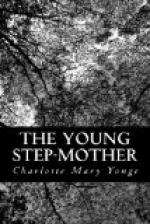’Albinia, poor Sophia’s admission into the Church has not been the only neglect. I have never been confirmed. I intend to speak to Dusautoy this evening, but I thought you would wish to know it first.’
‘Thank you. I suppose you went out to India too young.’
’Poor Maria says truly that no one thought of these things in our day, at least so far as we were concerned. I must explain to you, Albinia, how it is that I see things very differently now from the light in which I once viewed them. I was sent home from India, at six years old, to correspondents and relations to whom I was a burthen. I was placed at a private school, where the treatment was of the harsh style so common in those days. The boys always had more tasks than they could accomplish, and were kept employed by being always in arrears with their lessons. This pressed less heavily upon me than on most; but though I seldom incurred punishment, there was a sort of hard distrust of me, I believe because the master could not easily overwhelm me with work, so as to have me in his power. I know I was often unjustly treated, and I never was popular.’
‘Yes, I can imagine you extremely miserable.’
’You can understand my resolution that my boys should not be sent to England to be homeless, and how I judged all schools by my own experience. I stayed there too late, till I was beyond both tormentors and masters, and was left to an unlimited appetite for books, chiefly poetry. Our religious instruction was a nullity, and I am only surprised that the results were not worse. India was not likely to supply what education had omitted. Looking back on old journals and the like, I am astonished to see how unsettled my notions were—my sublimity, which was really ignorant childishness, and yet my perfect unconsciousness of my want of Christianity.’
’I dare say you cannot believe it was yourself, any more than I can. What brought other thoughts!’
’Practical obligations made me somewhat less dreamy, and my dear boy, Edmund, did much for me, but all so insensibly, that I can remember no marked change. I do not know whether you will understand me, when I say that I had attained to somewhat of what I should call personal religion, such as we often find apart from the Church.’
‘But, Edmund, you always were a Churchman.’
’I was; but I viewed the Church merely as an establishment—human, not divine. I had learnt faith from Holy Scripture, from my boy, from the infants who passed away so quickly, and I better understood how to direct the devotional tendencies that I had never been without, but the sacramental system had never dawned on my comprehension, nor the real meaning of Christian fellowship. Thence my isolation.’
‘You had never fairly seen the Church.’
’Never. It might have made a great difference to me if Dusautoy had been here at the time of my trouble. When he did come, I had sunk into a state whence I could not rouse myself to understand his principles. I can hardly describe how intolerable my life had become. I was almost resolved on returning to India. I believe I should have done so if you had not come to my rescue.’




